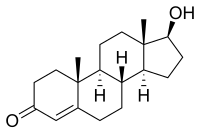
Photo from wikipedia
BACKGROUND Topical steroid withdrawal (TSW) is a newly described disease characterised by erythema and burning following discontinuation of prolonged use of mid- to high-potency topical corticosteroids. No consensus diagnostic criterion… Click to show full abstract
BACKGROUND Topical steroid withdrawal (TSW) is a newly described disease characterised by erythema and burning following discontinuation of prolonged use of mid- to high-potency topical corticosteroids. No consensus diagnostic criterion exists. TSW is frequently interpreted as flaring of the underlying disorder or contact allergy to topical treatment. OBJECTIVES To better characterise TSW symptomatology, detail our experience with management, and assess the proportion of patients who pursue nonconventional management. METHODS A retrospective review of case notes collected from our multidisciplinary service between January 2019 and June 2021 was carried out to identify patients presenting with TSW. RESULTS Nineteen cases of TSW were identified, 15 females and four males. The majority were under 35 years old. Eighteen had atopic dermatitis. The most frequently reported features were redness, skin pain (typically 'burning'), skin sensitivity, excessive skin flaking, insomnia, and severe itching. There was a high burden of anxiety and depression, with three patients expressing suicidal thoughts. Nonconventional treatments were pursued by approximately half the cohort, some of whom sought private consultation with international dermatologists. Improvements were noted in the context of open psychodermatology consultations with an earlier introduction of conventional management options. CONCLUSION Many patients report dismissal by dermatology healthcare professionals, often driving them to seek help from unregulated online sources, heightening the burden of mental, social and physical morbidity. Dermatology healthcare professionals need to be aware of TSW, and offer support with shared decision-making when considering treatments.
Journal Title: Clinical and experimental dermatology
Year Published: 2023
Link to full text (if available)
Share on Social Media: Sign Up to like & get
recommendations!